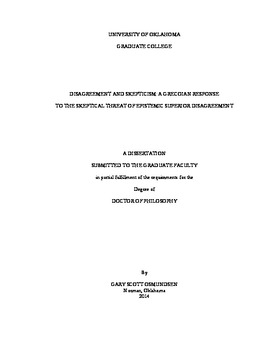| dc.contributor.advisor | Riggs, Wayne | |
| dc.contributor.author | Osmundsen, Gary | |
| dc.date.accessioned | 2014-08-08T16:59:17Z | |
| dc.date.available | 2014-08-08T16:59:17Z | |
| dc.date.issued | 2014-08-15 | |
| dc.identifier.uri | https://hdl.handle.net/11244/10483 | |
| dc.description.abstract | ABSTRACT: This dissertation is a response to the skeptical threats and challenges leveled by disagreement. Any plausible response to skepticism should explain what knowledge is and explain why the skeptic’s assumptions about what’s required for knowledge are false. In this dissertation I assume a virtue theoretic account of knowledge, which is a species of an externalist theory of knowledge. I defend this account of knowledge in the face of two problems I argue any externalist must address. The first problem is whether or not externalists can account for the kind of defeating evidence brought about by disagreement. Put differently: reliabilists need to explain how counterevidence from epistemic superior disagreement fits into a reliabilist scheme given what matters for reliabilists is that a true belief is sourced in a reliable process. The second problem is explaining what is wrong with what I take to be one of the strongest skeptical arguments from disagreement. The scope of this skeptical argument is modest in that one needs to recognize and be aware of an epistemic superior who disagrees with you over the veracity of some proposition. Nevertheless, it’s a skeptical argument that avoids what many think are pre-theoretically irrelevant scenarios such as cases involving malevolent demons, brains in vats, Matrixian pods, etc. The pre-theoretical obviousness that one is not in a vat of chemicals doesn’t generalize to the more modest claim that one needs to rule out an epistemic superior’s belief in theory t, which entails the denial of one’s belief that p.
Chapter One explicates how peer disagreement provides arguments for modest versions of skepticism. This chapter appeals to some of the leading proponents of this version of skepticism in order to draw together the common threads their skeptical arguments share. Once I identity the common threads shared by proponents of skepticism from disagreement, I put forth the argument for skepticism from disagreement. Chapters Two and Three argue why the problem of moderate skepticism in Chapter One is a pseudo-problem by arguing why internalism is not the only game in town when it comes to making normative evaluations. Chapter Three continues to explain why the argument for moderate skepticism is a pseudo-problem by arguing how unlikely it is to satisfy the conditions needed for the argument to go through. Chapter Four propounds what I take to be the strongest skeptical argument from disagreement. This chapter shifts the problem of disagreement from internalist’s concerns to externalist’s ones. The result is a skeptical argument that avoids the problems plaguing the original argument presented in Chapter One. Chapter Five provides Greco’s virtue theoretic account of knowledge. This chapter provides the theoretical resources needed to provide a Grecoian response to the challenges leveled against externalists in Chapter Four. Chapter Six explains the role defeaters play in epistemology and what a Grecoian account of defeater looks like. Once an account of defeating evidence is provided, an answer to the question “How can externalism provide an account of defeating evidence that comes from disagreement?” emerges. Chapter Seven provides a response to the new skeptical argument from disagreement laid out in Chapter Four. This chapter appeals to the theoretical resources provided in Chapter Five so as to complete this dissertation’s purpose of providing a Grecoian response to skepticism from disagreement. | en_US |
| dc.language | en_US | en_US |
| dc.subject | Philosophy. | en_US |
| dc.title | Disagreement And Skepticism: A Grecoian Response To The Skeptical Threat Of Epistemic Superior Disagreement | en_US |
| dc.contributor.committeeMember | Judisch, Neal | |
| dc.contributor.committeeMember | Montminy, Martin | |
| dc.contributor.committeeMember | Zagzebski, Linda | |
| dc.contributor.committeeMember | Hale, Piers | |
| dc.date.manuscript | 2014-08-06 | |
| dc.thesis.degree | Ph.D. | en_US |
| ou.group | College of Arts and Sciences::Department of Philosophy | en_US |
